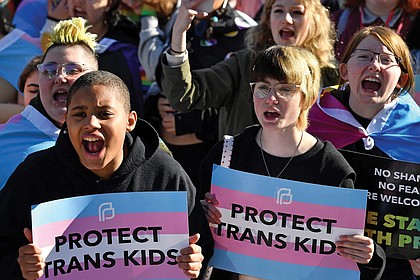Why do Christians create structures that hurt trans children?, by Candice Benbow
4/27/2023, 6 p.m.
There are currently 44 states with anti-trans legislation. They run the gamut from banning drag performances to prohibiting care to trans youths to restricting the use of public restrooms and facilities.
The proponents of these bills would have people of faith, particularly Christians, believing these laws are about the safety of children, preying on most parents’ desire to protect their children from harm. But, in so doing, they contribute to the lie that children are more likely to experience sexual assault when in community with trans people.
But anti-trans legislation is not about keeping children safe at all. Rather, these laws reinforce an uncomfortable truth: America is soulless. There is something demonic about using children as political pawns.And that’s exactly what is happening here.
The desire to “protect” children only extends to youths who fit squarely in the traditional boxes of heteronormativity. Because how could this ever be about caring for children when parents of trans kids — and the people who fail to report them — can be held criminally responsible for giving them the care they need? Can we say we care about children when we pass laws, like in Kentucky, that put them in more danger and directly in harm’s way?
More than 8 in 10 trans individuals (82%) have contemplated suicide, and the rates of suicide, the risk of suicide and suicidal ideation, are highest among trans youths. In 2022, The Trevor Project released a study showing that 50% of trans and nonbinary youths seriously considered suicide that year. And just last month, a study found that the rate of suicide attempts for Black trans youths is twice the rate of suicide attempts among cisgender Black queer youths.
How do Christians, in good conscience, create structures that isolate children — the very ones their savior said would inherit the kingdom of God in Matthew 18?
Answering this exposes the reality that Christian proponents and supporters of these laws do not see the image of God reflected in trans children, and more broadly, trans people. And while that is incredibly unfortunate, the trans community should not have to pay for their willful ignorance and bigotry.
At its core, the notion that trans youths endanger their cisgender peers is silly. What is true is that these anti-trans laws (and the myopic perspectives that inform them) are at the heart of the bullying and harassment that trans youths experience at the hands of their peers.
Many of us say it all the time: “Trans women are women” and “trans men are men.” We say it because it’s true. And, while it unfortunately does not seem to resonate with those who are committed to the rejection of trans dignity and humanity, what about the children? Because trans children arec hildren. And, in a world that has refused to relinquish its relationship with violence, don’t all children deserve to be safe?
All of our children deserve better. Transgender youths deserve a world where they are safe, and cisgender youth deserve that same world. It can come into being when adults push past their own agendas and limited understandings to let it be so.
More than half of Americans (54%) oppose anti-trans legislation, specifically laws that criminalize gender-affirming care for minors. This is a good thing. Perhaps America isn't that soulless after all. Perhaps the majority of us do care about all children and desire to create a world where their thriving is essential. If only our legislation — and lawmakers — reflected this intention.
At the same time Jesus told his disciples that they must become like children to enter into heaven, he also said it would be better for a millstone be placed around a person's neck and to drown than for that person to make life unnecessarily hard for children.
The ability for children to flourish mattered that much to Jesus, and it should matter that much to us, too. We cannot call ourselves followers of the one who so boldly said “let the children come” when we pass laws that push them away.
The writer is a public theologian and columnist for Religion News Service.








